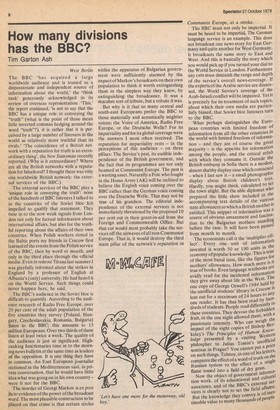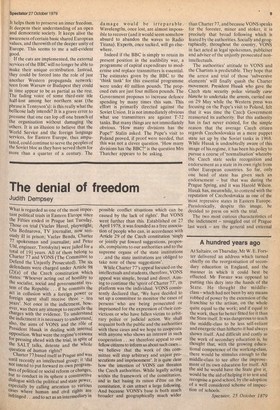How many divisions has the BBC?
Tim Garton Ash
West Berlin The BBC 'has acquired a large worldwide audience and is trusted as a dispassionate and independent source of information about the world,' the 'think tank' generously acknowledged in its review of overseas representation. 'This,' the report continued, 'is not to say that the BBC has a unique role in conveying the "truth" (what is the point of those mean little inverted commas hedging around the word "truth"?), it is rather that it is perceived by a large number of listeners in the world as relatively more truthful than its rivals.' The coincidence of a British network with a reputation for truth is an extraordinary thing', the New Statesman recently reported. (Why is it extraordinary? Where are all the British networks with a reputation for falsehood? I thought there was only one worldwide British network: the external services of the BBC.) The external services of the BBC play a 'unique role in conveying the truth': none of the hundreds of BBC listeners! talked to in the countries of the Soviet bloc felt impelled to qualify that statement. They tune in to the now weak signals from London not only for factual information about international affairs, but also for the truthful reporting about the affairs of their own , countries. When Polish workers rioted in the Baltic ports my friends in Cracow first learned of the events from the Polish service of the BBC, then by word or mouth, and only in the third place through the official media. Even in remote Tirana last summer I was gleefully informed about the strikes in England by a professor of English at Albania's (only) university. He had heard it on the World Service. Such things could never happen here, he said.
The BBC's audience in the Soviet bloc is difficult to quantify. According to the audience research of Radio Free Europe, over 20 per cent of the adult population of the five countries they survey (Poland, Hungary, Czechoslavakia, Romania, Bulgaria) listen to the BBC; this amounts to 15 million Europeans. Over two thirds of them listen at least twice a week. The quality of the audience is just as significant. Highranking functionaries tune in to the morning news bulletin at the same time as leaders of the opposition. It is one thing they have in common. An East European journalist stationed in the Mediterranean said, in private conversation, that he would have little idea what was going on in his own country— were it not for the BBC.
The murder of Georgi Markov is ex post facto evidence of the power of the broadcast word. The most plausible construction to be placed on that crime is that certain circles within the apparatus of Bulgarian government were sufficiently alarmed by the impact of Markov's broadcasts on their own population to think it worth extinguishing them in the simplest way they knew, by extinguishing the broadcaster. It was a macabre sort of tribute, but a tribute it was.
But why is it that so many central and south-east Europeans prefer the BBC to those materially and acoustically mightier voices: the Voice of America, Radio Free Europe, or the Deutsche Welle? For its impartiality and for its global coverage were the answers I most often received. The reputation for impartiality rests — in the perceptions of this audience — on three pillars: The Service's past, its audible independence of the British government, and the fact that its programmes are not only beamed at Communist Europe. The past is a wasting asset. Naturally a Pole who fought in the Home Army (AK) will be inclined to believe the English voice coming over the BBC rather than the German voice coming over the Deutsche Welle. That may not be true of his grandson. The editorial independence of the external services is not immediately threatened by the proposed 10 per cent cut in their grant-in-aid from the Foreign and Commonwealth Office. But that cut would most probably take the services off the airwaves of all non-Communist Europe. That is, it would destroy the third main pillar of the network's reputation in 'Let's have one more for the motorway, old boy.' Communist Europe, at a stroke.
The BBC must not only be impartial. It must be heard to be impartial, The German language service is an example. This does not broadcast one news story for East Germany and quite another for West Germany. It broadcasts the same story to East and West. And this is basically the story which you would pick up if you turned your dial to the World Service in London. Furthermore any cuts must diminish the range and depth of the service's overall news-coverage. If the experts of the Arabic service are dismissed, the World Service's coverage of the Arab-Israeli conflict will be impaired. Yet it is precisely for its treatment of such topics, about which their own media are particularly biased, that Soviet bloc listeners turn to the BBC.
What perhaps distinguishes the European countries with limited freedom of information from all the other countries in the world with limited freedom of information 7 and they are of course the great majority — is the appetite for information among the people, and the critical relish with which they consume it. Outside the British embassy in Sofia there is a modest, almost shabby display-case which contained — when I last saw it — a small photographic display about British children's toys. Hardly, you might think, calculated to set the town alight. But the able diplomat who prepared the little show included in the accompanying text details of the various state allowances to which a British mother is entitled. This snippet of information was a source of obvious amazement and fascination to the Bulgarian mothers standing before the case. It will have been passed from mouth to mouth. The economists call it the 'multiplier efffeet'. Every one unit of information invested is worth 50 or 100 units in the economy of popular knowledge :This is true of the most banal item, like the figures for mothers' allowances. How much more is it true of books. Even language textbooks are avidly read for the incidental information they give away about life in the West. The one copy of George Orwell's 1984 held by the unofficial students' library in Cracow Is lent out for a maximum of 24 hours to any one reader. It has thus been read by hundreds of students. People read differently in these countries. They devour the forbidden fruit, in the one night allowed them, with a passionate intensity. Who can weigh the impact of the eight copies of Bishop Berkeley's The Principles of Human Knowledge presented by a visiting Weste!rn, philospher to Julius Tomin's unofficial seminar, in Prague? You cannot put a price on such things. Tolstoy, in one of his letters, compares the effect of a word of truth on the Russian system to the effect of a single flame tossed into a field of dry grass. Now the object of government information work, of its educational and cultural associates, and of the BBC's external set-vices is clearly not to set the field afla. me. But the knowledge they convey is of ine.5. timable value to many thousands of peoPte It helps them to preserve an inner freedom. It deepens their understanding of an open and democratic society. It keeps alive the awareness of certain basic shared European values, and therewith of the deeper unity of Europe. This seems to me a self-evident good.
If the cuts are implemented, the external services of the BBC will no longer be able to make their unique contribution. Instead, they could be forced into the role of just another Western propaganda network: seen from Warsaw or Budapest they could in time appear to be as partial as the rest. The fading voice of some third-rate isle half-lost among her northern seas (the phrase is Tennyson's): is this really what the bellicose lady intends? It is a grave error to presume that one can lop off one branch of the organisation without damaging the others. It is an illusion to believe that the World Service and the foreign language services, for Eastern Europe, thus amputated, could continue to serve the peoples of the Soviet bloc as they have served them for more than a quarter of a century. The damage would be irreparable. Wavelengths, once lost, are almost impossible to recover (and it would seem somehow absurd to abandon the waves to Radio Tirana). Experts, once sacked, will go elsewhere.
Indeed if the BBC is simply to retain its present position in the audibility war, a programme of capital expenditure to modernise and replace transmitters is essential. The estimates given by the BBC to the 'think tank' for this essential programme were under 40 million pounds. The proposed cuts are just four million pounds. The Government proposes to increase defence spending by many times this sum. This effort is primarily directed against the Soviet Union. It is not immediately obvious what use transmitters are against T-72 tanks. But many things are not immediately obvious. 'How many divisions has the Pope?' Stalin asked. The Pope's visit to Poland proved, if proof were needed, that this was not a clever question. 'How many divisions has the BBC?' is the question Mrs Thatcher appears to be asking, than Charter 77, and because VONS speaks for the forester, miner and stoker, it is precisely that broad following which is feared by the authorities. Socially and geographically, throughout the country, VONS in fact acted as legal spokesman, publiciser and adviser of the unjustly prosecuted nonintellectuals.
The authorities' attitude to VONS and the Chartists is predictable. They hope that the arrest and trial of those 'subversive elements' will finally quash the Charter movement, President Husak who gave the Czech state security police virtually carte blanche to undertake the arrests, carried out on 29 May while the Western press was focusing on the Pope's visit to Poland, felt that it was time the Czech Government reasserted its authority. But this authority has in fact never existed, for the simple reason that the average Czech citizen regards Czechoslovakia as a mere puppet state set up by the Soviet tanks in 1968. While Husak is undoubtedly aware of this image of his regime, it has been his policy to pursue a course of 'normalisation' whereby the Czech state seeks recognition and endorsement as a state in its own right from other European countries. So far, only one head of state has given such an endorsement — but that was during the Prague Spring, and it was Harold Wilson, Husak has, meanwhile, to contend with the reputation of Czechoslovakia as one of the 'most repressive states in Eastern Europe. Paradoxically, despite this image, he decided to press on with the trial.
The two most curious characteristics of the indictment — smuggled out of Prague last week — are the general and external



































 Previous page
Previous page